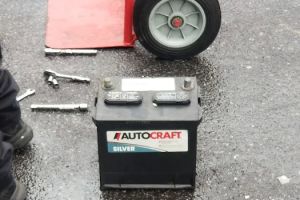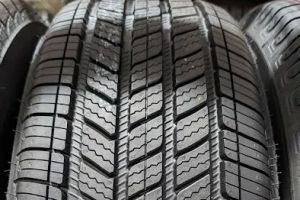How to Prevent and Fix Flat Tires on the Road
As a driver, one of the most dreaded experiences is a flat tire while you're on the road. Whether you're commuting, on a road trip, or running errands, the moment you hear that dreaded thud or feel the car pulling, it's easy to panic. However, understanding how to prevent flat tires and how to deal with them when they occur can save you time, money, and stress. In this article, I will share some valuable insights on how to prevent flat tires, as well as step-by-step instructions on how to fix them should you find yourself in this situation.

AutoZone Auto Parts
5701 Broadway, Bronx, NY 10463, USA
1. The Importance of Tire Maintenance
The best way to deal with flat tires is to prevent them from happening in the first place. Regular tire maintenance plays a significant role in keeping your tires in good condition. One of the simplest things you can do is to check your tire pressure regularly. Under-inflated tires are more prone to punctures and can also affect your vehicle’s fuel efficiency.
Additionally, rotating your tires every 6,000 to 8,000 miles ensures that they wear evenly, preventing any one tire from becoming too worn out, which can lead to a higher risk of a flat. Don't forget to check the tread depth as well. If the tread is too worn, it's time to replace your tires.
Another preventative measure is inspecting the tires for visible damage like cuts, punctures, or bulges. Any abnormalities can lead to a flat, so it’s essential to replace or repair damaged tires before they become a bigger issue. Make sure your tire valves are also in good condition and not leaking.

Costco Tire Center
1250 Old Country Rd, Westbury, NY 11590, USA
2. Recognizing the Signs of a Flat Tire
Before you experience a flat tire, it’s crucial to understand the signs that could indicate a problem. While driving, if you notice any pulling to one side or feel your vehicle vibrating strangely, these could be signs that your tire is losing air. If you hear a loud thud or a sudden drop in your car’s performance, you may have already suffered a puncture or flat.
It’s essential to stop as soon as you safely can if you notice any of these signs. Continuing to drive on a flat tire can cause significant damage to your tire and your vehicle, increasing the cost of repairs. Keeping an eye on tire pressure through regular checks can help you catch issues before they develop into full-blown flat tires.
3. How to Prevent Flat Tires When Driving
There are several things you can do while driving to prevent the likelihood of a flat tire. One of the simplest is to avoid potholes, sharp debris, and curbs. Hitting a curb or driving over a pothole can cause a puncture, particularly if your tires are already under-inflated.
Moreover, driving at moderate speeds reduces the strain on your tires and decreases the risk of tire blowouts, especially in hot weather. In hot climates, the heat can cause tire pressure to rise, increasing the risk of a blowout. Keeping your tires properly inflated can help mitigate this risk.
If you’re heading into an area with poor road conditions, it’s a good idea to check your tires before you embark on your journey. Having a basic tire repair kit in your car can also help you fix minor issues before they become serious problems.
4. What to Do When You Get a Flat Tire
If you find yourself with a flat tire while driving, don’t panic. The first thing you should do is pull over to a safe area, away from traffic. Turn on your hazard lights to alert other drivers. If you have a spare tire and the necessary tools, you can change the flat tire yourself. Here's a step-by-step guide:
- Step 1: Loosen the lug nuts on the flat tire using a lug wrench, but don't remove them completely.
- Step 2: Use a jack to lift the car off the ground, raising the flat tire off the surface.
- Step 3: Completely remove the lug nuts and take off the flat tire.
- Step 4: Put the spare tire on the hub, ensuring it fits securely.
- Step 5: Tighten the lug nuts in a crisscross pattern to ensure an even fit.
- Step 6: Lower the car back to the ground, and then tighten the lug nuts again for a secure fit.
Make sure to check the spare tire's pressure before you begin driving, as a low spare tire can also cause problems. If you don't have a spare tire or the tools to change the flat, you’ll need to call a roadside assistance service for help.
5. How to Fix a Flat Tire Temporarily
If you're stranded and can't access a spare tire or roadside assistance, you can use a tire repair kit to temporarily seal small punctures. These kits typically include a sealant that can be injected into the tire through the valve stem. This is a temporary fix that allows you to drive to the nearest service station or repair shop for a more permanent solution.
It's important to note that this method should only be used for small punctures. If your tire has suffered significant damage, a repair kit may not suffice, and you’ll need to replace the tire.
6. When to Seek Professional Help
While knowing how to prevent and fix a flat tire on the road is essential, there are times when it’s best to leave the repair to professionals. If you're unable to change the tire safely or if the damage is too severe, it’s always a good idea to call for professional help. Mechanics or roadside assistance services can provide the expertise needed to handle a more complex situation, ensuring your tire is properly repaired or replaced.
In some cases, a professional tire inspection might be necessary if you have frequent flat tires. This could indicate an underlying issue, such as improper alignment or suspension problems, which can be fixed by a professional.
Conclusion
Flat tires are an unavoidable part of driving, but with the right knowledge and preparation, you can minimize their impact. Regular tire maintenance, vigilance while driving, and knowing how to fix a flat on the spot are all essential skills for any driver. Keep your tires in top condition, and remember to take immediate action when a flat occurs. By doing so, you'll ensure that you stay safe and avoid costly repairs down the road.




























